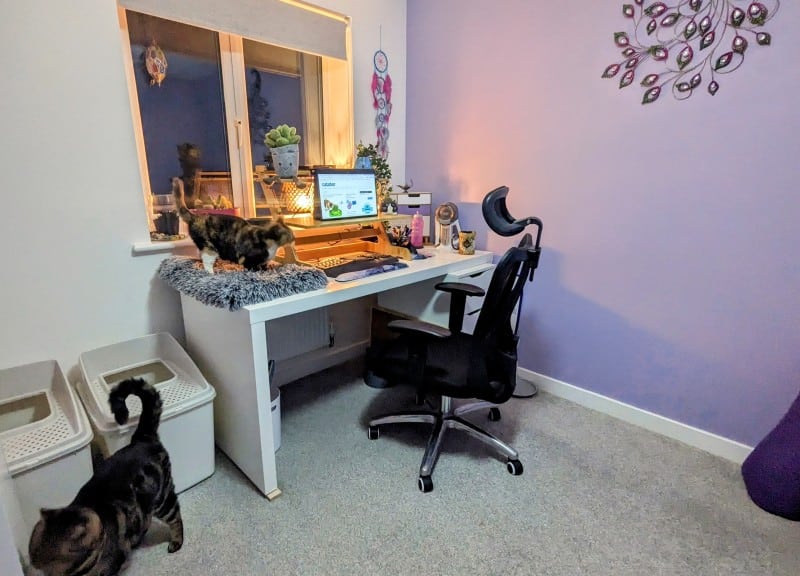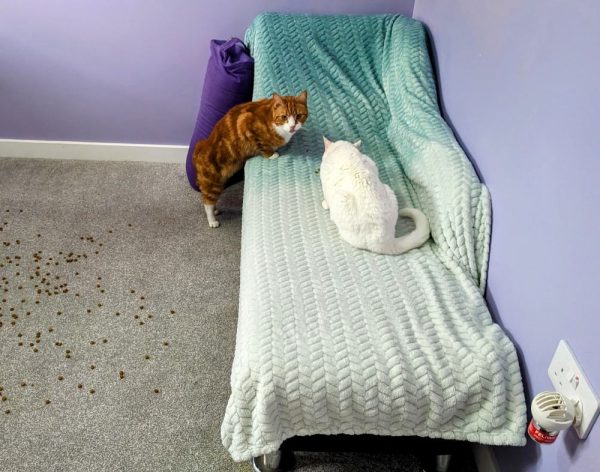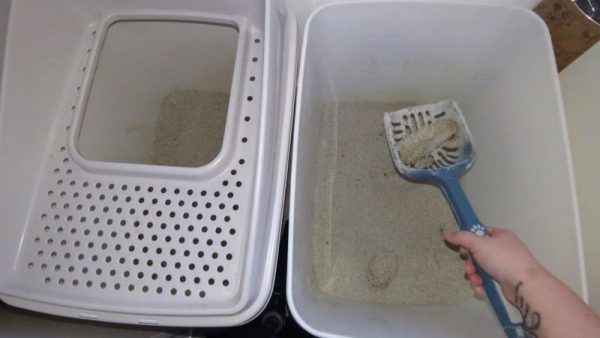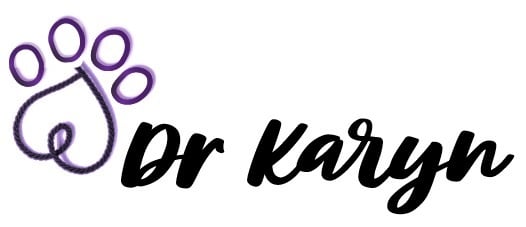- January 19, 2024
Cat Litter: Why It Pays to Get It Right

Hi, I’m Dr. Karyn! Read my introduction to learn more about me and meet my five hilarious cats: Clutch, Cyril, Alex, Zelda, and Zazzles.
Last week we were talking about how to choose the best food for your cat (you can read that column here), and that one of the ways we can tell how well your cat’s food is working for them is by looking in the litter box.
“If your cat farts a lot, poops more than once or twice a day, and clears a room when they use the litter box, it’s a sign that they aren’t digesting their food well.”
Not only is this a good indicator of your cat’s health and food quality, for me, it is an important consideration because the cat litter trays are located in my home office. So when it comes to food and cat litter, I spare no expense. But does that mean I’m paying ridiculous amounts for my cat supplies? No, and you don’t have to either.
What’s Food Got To Do With It?
One of the points I made last time was that even though higher quality foods are more expensive, their high digestibility means that you end up feeding as little as half the amount of a cheaper brand.
The other benefit of this, apart from the obvious benefits to your cat’s health, is that your litter box takes less punishment too. If your cat’s poops are large, loose, and frequent, you are scooping out more litter more often.
When it comes to my feline’s bowel movements, I am scooping one small poop per cat per day. This means less wasted cat litter, less mess in my litter box, less work for me and a much more pleasant work environment!
I am extremely fortunate that my cats have formed quite a cohesive group, and will actually share litter trays. Ordinarily, I recommend a minimum of one tray per cat plus one extra, but over time, I realized that my cats weren’t even using all the trays, which is unusual in a group of unrelated felines!
One factor that has possibly influenced this is the small size and reduced odor of their poop, and how well the litter covers it.

What Are My Options?
You’re probably aware that there are quite a few different varieties of cat litter, making it tough to know which one to choose. Much like with cat food, you generally get what you pay for, in that the cheap and cheerful non-clumping clay litter will do the job, but you’ll go through it much quicker than you would a clumping type. Because it doesn’t bind the urine, there is minimal odor control, and you’ll need to completely change out the litter every couple of days.
For years there has been concern voiced over clumping litter, and whether its cohesive properties pose a risk to the inner workings of our cats’ digestive system. Well, you might be surprised to learn that there is virtually no scientific evidence to support this fear. In fact, the opposite might even be true.
Cats get hairballs as the hair swallowed during a grooming session gradually accumulates in their digestive tract. With nothing substantial to move it along, it builds up over time until it forms a solid clump. The addition of a few cat litter particles into this equation would likely help push the hair along the intestines.
There is the fancy silica gel litter that traps urine, and its odor, and the only thing you need to scoop out is feces. If I was a single cat household, this is probably the one I would go for, but with this many cats, it isn’t the most cost effective option for me.
Then there are the various eco-friendly litter options such as paper, wood, wheat or corn. I would like to be able to say that I put the environment before my own personal needs, but these materials just don’t cut it when it comes to odor control.
For my clowder, I opt for a fine clumping clay litter. It’s not stupidly expensive, but it is a bit pricier than some of the more basic clumping litter. The fine particles hold liquid more effectively and allow my cats to dig and cover their poop more effectively, all of which equates to excellent odor control.

Which Litter Is Best?
Am I telling you that fine particle clumping litter is the best cat litter option for everyone? I am not. One of the annoying features of this type of litter is that it tracks. Despite having top entry litter boxes, I still find litter particles on my desk, laptop, window sill, sofa…and that might be a deal breaker for some. For me, whose priority is odor control, it is an acceptable drawback.
If I could tuck the litter boxes in a different part of the house, I would probably rethink my options, and consider a more eco-friendly material. If I had just one or two cats, the silica gel would be a strong contender, although it is the worst in terms of the environment.
But here I am making it all about me. Not only am I lucky that my cats all get along, I am also lucky that they all seem to be happy with the litter I have chosen, because that’s not always the case. You might do your research, make a decision, only to find that your cat won’t touch it. This is more common with the little silica gel balls or wood or paper pellets, as some cats don’t like the feel of them underfoot. So the other thing you need to be aware of, and prepared for, is your cat’s personal preferences.
Just like we did with our cat food discussion, when it comes to choosing cat litter, the best product for you and your cats, might not be what’s best for the cat next door.
One thing I will say is that if you’re looking to save some dollars, don’t do it by buying that giant bag of non-clumping clay. You don’t have to go top of the line, but spending a little bit more on a decent clumping cat litter will be worth it; trust me.

Tags
What do you think?
Related Articles

New Puppy Checklist: Gear You’ll Need for Your New Dog
Getting a new puppy is really exciting, but before you welcome them home, it’s important to prepare your space for them. Since puppies need a

How Big Do Mini Poodles Get? Vet Reviewed Average Weight & Growth Chart – Dogster
The information is current and up-to-date in accordance with the latest veterinarian research. Learn more » When you buy a Miniature Poodle, you might not

Can Police Dogs Smell Nicotine? Vet Verified Facts & Info – Dogster
The information is current and up-to-date in accordance with the latest veterinarian research. Learn more » While cigarette sales have been declining steadily for decades,

How Old Is 5 in Dog Years? Vet-Approved Guide to Each Size of Dog – Dogster
The information is current and up-to-date in accordance with the latest veterinarian research. Learn more » A common method for calculating a dog’s age is

